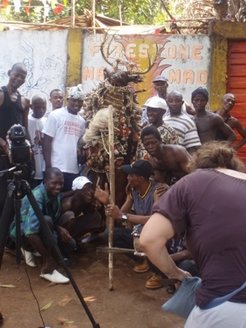Contested Spaces in Post-war Society: The ‘Devil Business’ in Freetown, Sierra Leone
Background
Towards the end of the transatlantic slave trade – between the end of the 18th and the middle of the 19th century – many former slaves from America, Britain, and the Caribbean were relocated to the area that is now Freetown on the initiative of British philanthropists. Britain also attempted to enforce the abolitions of the slave trade by intercepting slave-ships bound for the Americas. They redirected them to the colony, freed the intended slaves and resettled them into the community of the ex-slaves already on site. These different groups of liberated slaves underwent a process of creolization, mixing among each other as well as incorporating members of local communities. Thereby a new community emerged which came to be known as “Krio” and which cultivated and portrayed Christianity and formal education as distinctive ethnic markers.

The “Devil Business”
Despite the demarcation which developed between the Krio and Freetown on the one hand and all other groups and the “rest” of Sierra Leone on the other as a result of the Krios’ privileged status and derogatory attitude towards the “natives”, many social and cultural commonalities existed between the former and the latter. Particularly the “new arrivals” from the slave-ships – which had quickly outnumbered the “first arrivals” from across the sea – had a lot in common with the local population they encountered in Sierra Leone. One of the shared features was a tendency towards secret organisation as a means of social inclusion and exclusion. Hence, as one outcome of creolization new urban secret societies developed in Freetown (and beyond). They were largely modelled on Yoruba secret societies but also integrated features prevalent among other ethnic groups, thereby reflecting the diversity of Krio and Freetown society.
These urban secret societies, as other such societies, are called “secret” because their internal activities and knowledge are (ideally) unknown and inaccessible to non-members. Freetown secret societies – often referred to as “devil business” – are generally not organized along ethnic lines and they cut across religious boundaries, too. They serve as power-bases of different – often competitive – urban groups which are associated with their respective masquerades (“devils”) and with different social, economic and political actors and spaces in society at large.
During Sierra Leone’s civil war, which started in 1991 and officially ended in 2002, a bulk of the national army took sides with the rebels fighting against the state. The government solicited the assistance of urban as well as provincial secret societies and constituted them into what became the “Civil Defence Forces” to help quash the rebellion.
In post-war Freetown the masquerades of these secret societies, especially the more recent ones, are competing for public space among themselves and with other bodies. These competitors are the country’s legislature, executive, judiciary, political parties, NGOs, prominent families and successful businesspeople to be post-war social, economic and power bases / brokers.
The aim of the study is to investigate the roles and meanings of contemporary urban secret societies in the contested social and political fields of post-war Sierra Leone. The research will thereby also look at the collaborative and / or antagonistic relationships between the older and younger secret societies in the post-war period. The older ones have minimum qualifications of membership which are most often related to family background, social standing, and education, among others. The newer societies seemingly have a focus on mass, rather than on exclusiveness and restricted membership. With this prioritisation they challenge the established norm, potentially resulting in conflict with the longer-established sodalities.
Some of the specific questions guiding my research are:
- What are the relationships between the older urban traditional secret societies/masquerades and the new or emerging ones?
- What are the relationships between the urban secret societies/masquerades and new forms of social and political organisation like civil society movements and NGOs?
- What were/are their roles in conflict and conflict mediation?
- What were their roles during the Sierra Leone civil war?
- How have these secret societies changed since the war?
- What are the integrative and exclusionary functions of these secret societies?
- What are the gender-dimensions of the post-war ‘devil business’?
- What are the roles of these societies in identity formation, identity reinforcement and the construction of nationhood?
- How do these societies relate their group identity to a national identity?
